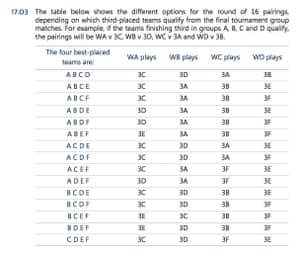Competitions with 16 or 32 teams are quite straightforward – the top two teams in each group progress to the knockout stages.
However the expanded Euro 2016 format means that only eight teams are jettisoned after the group stages. Four teams that have finished third in their group will progress to the knockout rounds. Two will not.
How are the teams who finish third ranked?
Uefa makes a league table that features the six teams occupying third place in their groups after all the group matches are finished. This table is initially ranked in order by: points, goal difference, and goals scored.
If teams are level on points and have the same goal difference and same number of goals scored, further tie-breaking criteria are applied. First, the team with the better disciplinary record during the tournament would be placed higher.
Each team starts with 10 disciplinary points and loses one for each yellow card and three for each red card (a sending-off for two yellow card counts as three points; a player already booked who then commits a straight red card offence costs the team four points). Teams can end up with a negative number.
If both teams have the same disciplinary record, then the nation with the higher Uefa coefficient would progress.

At the moment, after each team has played two games, the table looks like this:
Northern Ireland - Pts 3 GD +1 GF 2
Disciplinary points 6; Uefa coefficient 22,961
Slovakia - Pts 3 GD 0 GF 3
Disciplinary points 4; Uefa coefficient 27,171
Portugal - Pts 2 GD 0 GF 1
Disciplinary points 8; Uefa coefficient 35,138
Czech Republic - Pts 1 GD -1 GF 2
Disciplinary points 8; Uefa coefficient 29,403
Romania - Pts 1 GD -1 GF 2
Disciplinary points 3; Uefa coefficient 28,038
Sweden - Pts 1 GD -1 GF 1
Disciplinary points 8; Uefa coefficient 29,028
The top four teams go into the second round based on this ranking.
How do they decide who and where the third-placed teams play?
In order to avoid teams immediately running into each other again in the knockout rounds, the third-placed teams are allocated to matches depending on which groups they have come from.
Here is the official grid from the UEFA regulations that determines who goes where:

This leads to the somewhat difficult situation that the teams who finish in third place in Group A and Group B will not know for sure who they are playing, where, and when until the final whistle goes in the concluding games in Group F.
How many points will be enough to go through in third place?
The last time this system was used in a major international competition was in the 1994 World Cup. Two teams progressed from third place in the group stages with six points, and two with four points. That included Italy, en route to their appearance in the final.
It is possible, depending on results, that three points may be good enough this time around for at least one team.

What happens if Russia or any other team are disqualified?
After violence in the stadium during the game against England, Russia have a suspended disqualification hanging over them. Croatia must be concerned that Uefa will impose a similar punishment on them.
The regulations state: “If an association is disqualified during the competition, the results of all of its matches are declared null and void, and the points awarded forfeited.”
The rules make no mention of any special provision being made for calculating the points total of the team finishing third in the group in that situation. It is understood an emergency panel will be set up to make such a decision.
There could have been penalty shootouts in the group stages
It was always extremely unlikely, but there is provision in the rules for teams to have to take part in a penalty shootout after their final group game.
Teams who are level on points, have the same goal difference and same goals scored, and who are playing each other in the last group game, who draw, and are the only teams in the group tied in this way would then have had a shootout to determine their position in the group.
Just as in every competition since Euro 2004 when the rule was introduced, it will not prove necessary.
--
Latest Stories
-
Mahama decouples Youth and Sports Ministry, to create Sports and Recreation Ministry
14 minutes -
Mahama’s open endorsement of Bagbin needless – Rabi Salifu
44 minutes -
Police station torched as Ejura youth clash with officers
46 minutes -
If Ibrahim Traoré goes civilian, it may be because of Mahama’s inauguration – Prof Abotsi
1 hour -
Kwaku Asare welcomes Mahama’s reduction in Ministries but advocates legislative process to cement it
2 hours -
I’m concerned about failure to implement AWW report – Prof Abotsi
2 hours -
US returns $50m in alleged stolen funds to Nigeria
2 hours -
Mahama restructures Ministries, reduced from 30 to 23 – See full list
2 hours -
2 siblings die after being locked in water drum by 6-year-old sister
3 hours -
Mahama shouldn’t have openly directed Parliament to elect Speaker – Prof. Kwaku Asare
3 hours -
Daily Insight for CEOs: The power of delegation – Empowering leaders within your organization
3 hours -
Livestream: Newsfile discusses inaugurations, prisoner pardon and failed CJ petition
4 hours -
Revisiting the forensic audit of EC will increase credibility of future elections – Omane Boamah
6 hours -
Africa Food Systems Parliamentary Network urges governments to increase investment in agriculture
13 hours -
AU and partners urge youth to get involved in efforts to transform continent’s food systems
13 hours

